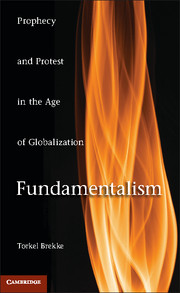Book contents
- Frontmatter
- Contents
- Acknowledgments
- Introduction
- Part I The Historical and Ideological Context of Fundamentalism
- Part II Fundamentalist Struggles
- 5 The Struggle for the State
- 6 The Struggle over Law
- 7 The Struggle for the Sciences
- 8 The Struggle over Education
- 9 The Struggle over Women
- Conclusion
- Bibliography
- Index
- References
6 - The Struggle over Law
from Part II - Fundamentalist Struggles
Published online by Cambridge University Press: 05 June 2012
- Frontmatter
- Contents
- Acknowledgments
- Introduction
- Part I The Historical and Ideological Context of Fundamentalism
- Part II Fundamentalist Struggles
- 5 The Struggle for the State
- 6 The Struggle over Law
- 7 The Struggle for the Sciences
- 8 The Struggle over Education
- 9 The Struggle over Women
- Conclusion
- Bibliography
- Index
- References
Summary
Some years ago, I interviewed evangelical and fundamentalist leaders in Norway because I was writing a book about the relationship between religion and politics. Scandinavian societies – Norway, Denmark, and Sweden – are often seen as prime examples of secularized nations, and the people I interviewed were all extremely concerned about the gradual erosion of belief and morals among modern Norwegians. As a response to the decline of religion, Protestant Christian fundamentalists founded a political party called the Christian Unification Party (Kristent samlingsparti) in 1998. Its vision was neatly summed up in an article published in the magazine Ny framtid (New Future) in 1999: “We want to stop the de-Christianization of Norway and contribute to the re-Christianization of Norway. We want a law code that is not in conflict with the Bible and the Constitution.” The party is still active, and in the parliamentary elections of 2009, it got roughly 5,000 votes, which was around 0.2 percent of the total. In other words, this is a small party, but certainly not the smallest in Norwegian politics.
The Christian Unification Party is very concerned with law, constitutional law in particular. Norway got its constitution in 1814 as part of the settlement after the Napoleonic Wars, and the Christian Unification Party believes that the constitution was a gift from God to the Norwegian nation. However, according to Norwegian fundamentalists, the Norwegian Parliament passes laws that are in conflict with the letter of the Bible and the constitution, and the king has been stripped of his powers to intervene. According to the Christian Unification Party, the most glaring examples of such unconstitutional and un-Christian legislation are laws that legalize abortion and gay marriage, issues that are of concern to Christian fundamentalists everywhere. The abuse of power by Parliament is also seen in the liberal immigration laws that let Muslims into the country, thereby diluting Christian culture, according to the party. The solution to this hijacking of the political system by a modernist and liberal Parliament is the abolishment of the parliamentary system and the reestablishment of true respect for the king, the divine constitution, and the Bible.
- Type
- Chapter
- Information
- FundamentalismProphecy and Protest in an Age of Globalization, pp. 140 - 176Publisher: Cambridge University PressPrint publication year: 2011

